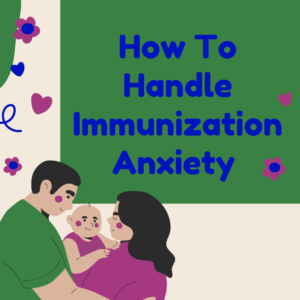How To Handle Immunization Anxiety
As parents we all know that immunizations, although necessary, can be a source of anxiety for little ones (and for us!). Here are Dr. Jessica Long‘s tips on how to keep our children calm during immunization visits.

I always hoped that, since I’m a pediatrician, my children would have no qualms about anything that happens at the doctor’s office. I was wrong. My children get as upset about shots, as fearful of a blood draw, and as manic about opening their mouths for a strep swab as the next kid. But shots don’t have to be a horrible experience for kids and parents alike. There are simple things we can do to calm our child, no matter her age, to make everything go a bit smoother.
Leading up to the doctor’s visit, your toddler or school-aged child may ask if it will hurt. Honesty is the best policy. Let him know that yes, it will hurt for a second, but it won’t be bad and you’re right there with him. Some kids like to role play beforehand, pretending to be the doctor giving shots to their parent or stuffed animal, which can make them more confident for the real thing.
At the doctor’s office, the first step in calming your child is checking in on your own mood. If you are relaxed that will rub off on your little one; if you’re stressed, that will too. How would you feel about getting a shot yourself? Probably not exactly excited about it, but also not too worried or afraid. You should feel that way about your child getting a shot. And your child will notice how you feel, and will tend to feel that way herself. Children are perceptive – pretending won’t help.
At the time of the shot, distraction can be very helpful. An infant may want to nurse, suck on a pacifier, or be skin to skin on a parent, all of which have been shown to reduce the stress of painful procedures in babies. An older child may want to hugged or cuddled, read a book, or even watch a favorite video on your phone. Encouraging your child to cough loudly right before and right after the shot has also been shown to reduce painful reactions in school aged kids and even middle schoolers (yes, they get scared, too).
Congratulate your child on being cooperative and brave, but don’t make too big a deal out of it Give her a high five, a hug or a cuddle to let her know you’re proud of her and then head out for a small reward. In our house we go for cake pops, and knowing there is a special treat waiting for my girls (and me!) at the end of a tough doctor’s visit puts everyone a little more at ease.


